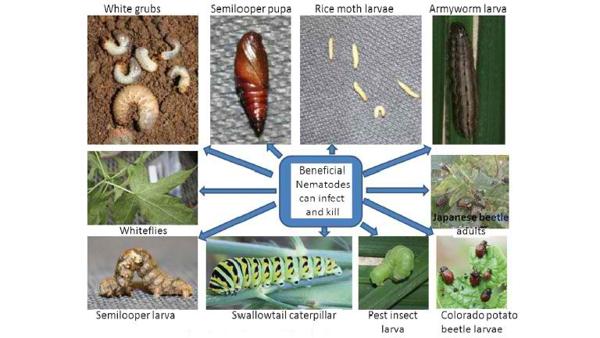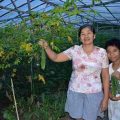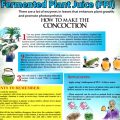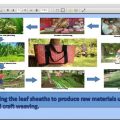People have often associated eating organically-grown salad greens with healthy eating. And since leafy greens and vegetables are eaten fresh, quality of the produce becomes a high-priced assurance both for farmers and consumers.
Consumers buy vegetables that are not only safe to eat, but are also free from damage. Health-conscious as they are, consumers are also meticulous. They don’t go after the quantity alone, but also the quality of the produce. For salad vegetables in particular, consumers want them fresh and clean, with fewer holes, creases, and wilt.

This applies for farmers too. Quality is an important measure in selling vegetable produce. Even if a farmer is selling organically-grown vegetables, if it’s not in good quality, he won’t be able to command a high price leading to more losses.
A major constraint to growing organically-produced salad vegetables is insect pest infestation resulting to major reduction both in yield and quality of the crops.
In organic farming, a widely accepted method to control pest infestation is through botanical spraying. But this was proven to be lacking as well, if not ineffective in some cases. Various approaches and techniques are being tried in combination with the spraying of botanicals and plant concoctions to make it more potent against pests without compromising its effect on the environment.
One technique that is currently being tried by a group of researchers from the Cebu Technological Univeristy (CTU)Barili Campus is the use of entomopathogenic nematodes (EPN) to control pest infestation in organically-produced salad vegetables. The project, “Identification of Indigenous Entomopathogenic Nematodes as Effective Biological Control Agent Against Common Insect Pests of Selected Organically-Grown Salad Vegetables in Cebu,” was led by Maria Lima Pascual of CTU-Barili Campus and was funded by the Bureau of Agricultural Research (BAR) through the National Organic Agriculture Program.
What are entomopathogenic nematodes?
According to Dr. Pet Roey Pascual, co-project leader, EPNs are soil-borne microorganisms that feed on their host. They are microscopic and they look like threadlike worms that invade in the host insects through natural body openings (i.e. anus, mouth, etc.). Once inside the host, they release a symbiotic bacterium, which is held in the nematode’s intestine, killing the host within 24-48 hours. These EPNs rapidly feed on the host cadaver disintegrating its tissues until it is totally dispersed and gone. This particular characteristic make them an excellent potential biocontrol agent against vegetable insect pests.
Since EPNs are found in soil, they serve as good indicator that the soil is in good condition. “Naturally, if the soil is in good condition, it is less exposed to inorganic chemicals, then there is a bigger chance that we can get EPN,” Dr. Pascual explained. He added that, EPNs possess a unique combination of attributes such as broad host range, high virulence, long term efficacy, easy application, easy mass production, compatibility with most chemicals, and are environmentally safe which make them ideal components of insect pest management system.
EPN is one technology that has been available for some time. In fact, advance countries like the United States and Europe have already been using it for quite awhile. “Even in Asian countries like Korea and Thailand, they are also using EPN to control insect pests in vegetables. In the Philippines however, this method has not been fully tapped and optimally tried by our farmers. And this is mainly due to lack of awareness of the farmers on the technology. If we can bring this technology to the knowledge of the public, particularly those who are into organic farming, then more people will benefit from it,” Dr. Pascual said.
Results of the project
Essentially, the CTU-BAR project has two components: 1) studying the ecology, biology, and pathogenicity of EPNs; and 2) determining the compatibility of EPN with different organic management practices like wood vinegar under greenhouse condition, use of microbial inoculants, application of organic fertilizer, and mulching.
Since the project specifically studied on EPNs that are indigenous in the area, the group collected samples from various farms in Cebu. Based on the result of morphometrics, from the 17 samples collected, there were four species of nematodes (Heterorhabditis) identified: Heterorhabditis indica, Heterorhabditis taysearae, Heterorhabditis bacteriophora, and Heterorhabditis marelatus. From the four species, H. bacteriophora and H. taysearae are widely distributed in Cebu province. “Having this information, we thought of how we can use this at the farmer’s field,” said Dr. Pascual.
“What we really want is to promote EPN in combination or in complementation with other existing technologies such as the use of IMO, wood vinegar, organic mulching, vermicomposting, etc. Most farmers are already practicing either one or two of these organic pest management systems, but if partnered with EPN, which they can just apply once or twice a month, then it will be less laborious but more effective,” he explained.
Results of the study showed that when tested under greenhouse condition, 2-4 cadavers are effective in controlling insect pests but if combined with wood vinegar, two cadavers will be enough and effective. Meanwhile, when tested in the field, results found that EPN is effective if partnered with kakawate wood vinegar. For organic fertilization, EPN is effective if combined with composted cow manure. It was also found effective in combination with microbial inoculants. However, using mulching in combination with EPN was not found as effective because the population of the nematodes declined due to their immobility in the covered soil.
Impact of the EPN technology
In general, if EPN is used in combination with other existing cultural management practices, results of the leaf damage using VQR (visual quality rating) showed that there will be less 50 percent leaf damage in the plant. This means, it is 50 percent better if farmers use EPN rather than no management practice is applied.
“The leaves are cleaner, with fewer holes so farmers can market their produce at a relatively higher price. At the same time, consumers are assured since the produce are organically-grown therefore free from any harmful chemicals and are safe to eat,” said Dr. Pascual.
Abeth Lawat, one of the project adopters, has attested to the benefit of using EPN. She is already using IMO and kakawate wood vinegar. She tried applying EPN to eggplant as a trial and then went on to other leafy salads like lettuce and kale and found that there was less infestation and the leaves were clean. “Before I don’t know anything about EPN but when I learned about it, I was encouraged to use it because it’s easier and simple to do,” said Lawat.
When asked on what’s next for EPN, Dr. Pascual said that “the technology is relatively new to Filipino farmers so now that the project has been completed, we want to train more farmers on the EPN technology, and at the same time, disseminate this technology through conferences and seminars not only here in Cebu but the whole region. We want more farmers to be aware of this technologyand use it to profit them.” ### by Rita T. dela Cruz http://www.bar.gov.ph
———
Contact details: Dr. Pet Roey L. Pascual Director, College of Agriculture CTU-Barili, Cebu phone: (032) 470-9298 mobile: 0915-5245217 email: petroey262301@yahoo.com






